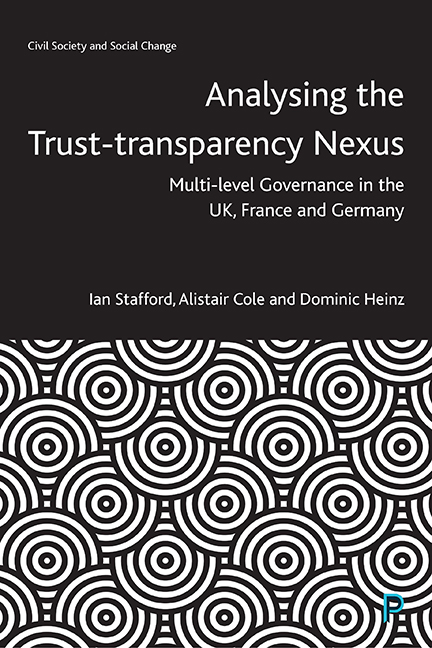Book contents
- Frontmatter
- Dedication
- Contents
- List of figures and tables
- List of abbreviations
- About the authors
- Acknowledgements
- Introduction
- 1 Building trust in an age of transparency
- 2 The trust–transparency nexus
- 3 Comparing cases
- 4 UK: North West England and Wales
- 5 Germany: Hesse and Saxony-Anhalt
- 6 France: Auvergne-Rhône-Alpes and Bretagne
- Conclusion: reflections on the trust–transparency nexus
- Appendix: qualitative fieldwork guide
- References
- Index
4 - UK: North West England and Wales
Published online by Cambridge University Press: 15 September 2022
- Frontmatter
- Dedication
- Contents
- List of figures and tables
- List of abbreviations
- About the authors
- Acknowledgements
- Introduction
- 1 Building trust in an age of transparency
- 2 The trust–transparency nexus
- 3 Comparing cases
- 4 UK: North West England and Wales
- 5 Germany: Hesse and Saxony-Anhalt
- 6 France: Auvergne-Rhône-Alpes and Bretagne
- Conclusion: reflections on the trust–transparency nexus
- Appendix: qualitative fieldwork guide
- References
- Index
Summary
One of the central themes of Boris Johnson's speech on the morning of 13 December 2019, following his party's landslide election victory, was trust, and specifically the trust placed in his government by voters who had previously never voted for the Conservative Party. Despite Brexit's almost all-encompassing domination of the political agenda in recent years, the decline of political trust in the UK can be characterised as representing a longer-term phenomenon (Whiteley et al, 2016). It has been portrayed by the BBC's political editor, Laura Kuenssberg, as the latest in a long line of events over the past 20 years that have ‘shattered’ public trust in politics, from the Iraq War in 2003 to the high-profile MPs’ expenses scandal in 2009 via the financial crisis in 2007– 8 (Kuenssberg, 2020). Furthermore, Brexit has been supplanted from the political agenda – even if only temporarily – by the COVID-19 pandemic, and once again the narrative around the decline of trust has come to the fore. Although Jennings (2020) noted an initial ‘rally-round-the-flag’ effect of the crisis, trust has steadily been eroded. The question of transparency has had a lower profile in terms of both academic and public debate. The primary focus around questions of transparency in the UK context have been the measures introduced in the Freedom of Information Act 2000, which came into force in January 2000 (Worthy and Hazell, 2017). As explored in Chapters 1 and 2, exploring transparency and its interaction with trust requires a nuanced analysis which moves beyond formal mechanisms and methodological nationalism.
This chapter applies the trust– transparency matrix outlined in Chapter 2 on different levels of the trust– transparency nexus in the UK case – exploring political trust at the UK and the subnational levels, and finally the trust–transparency dynamics within and between civil society at the subnational level. The chapter develops a comparative analysis of North West England, centred on the Greater Manchester City Region and Liverpool City Region, and Wales. It draws on a wide range of secondary sources including existing published research and survey data, policy documents and 39 semi-structured interviews carried out between 2017 and 2018. The chapter is divided into four core sections. The first section explores ‘thin’ conceptions of political trust and transparency in the UK context, primarily drawing on public attitude surveys.
- Type
- Chapter
- Information
- Analysing the Trust-Transparency NexusMulti-level Governance in the UK, France and Germany, pp. 61 - 87Publisher: Bristol University PressPrint publication year: 2022



